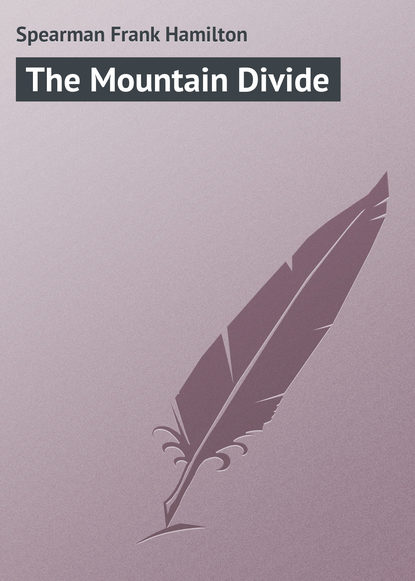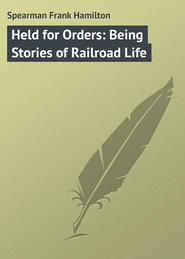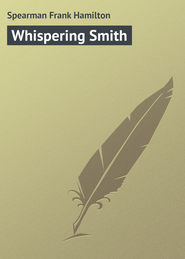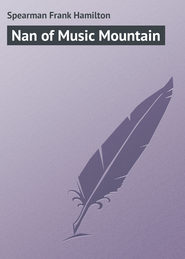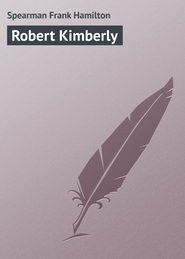По всем вопросам обращайтесь на: info@litportal.ru
(©) 2003-2024.
✖
The Mountain Divide
Автор
Год написания книги
2017
Настройки чтения
Размер шрифта
Высота строк
Поля
A cry went up from Perry when he heard the order, but the axemen, nothing loath, sprang inside to their work, and the crashing of the gambling furniture resounded through the alarmed camp. Stanley made no delay of his peremptory purpose. The tent attacked belonged to Seagrue, who, common report averred, feared nothing and nobody, while the gambling implements were Perry’s.
Seagrue rushed to his property, revolver in hand. Bill Dancing, who stood at Stanley’s side, stepped into his way.
“Hold on, Seagrue,” he said. The gambler, fully as large a man as Dancing, faced his opponent with his features fixed in rage. “Get away,” he shouted, “or I will knock your head off.”
All eyes centred on the two men. Every one realized that open war was on and that it needed only a spark to start the shooting. The gamblers, rallying to Seagrue, backed him with oaths and threats.
“Seagrue, put down that pistol or I’ll wring your neck,” returned the lineman, baring his right arm as he sauntered toward the outlaw. Bucks, beside Stanley, stood transfixed as he watched Dancing. The lineman’s revolver was slung in the holster at his side.
Seagrue hesitated. He saw Bob Scott standing in the doorway of the gambling tent with his rifle lying carelessly over his arm. He was actually covering Seagrue where he stood–and Seagrue knew that Bob Scott was deadly with a rifle. But Dancing was walking directly up to him and Seagrue dared not be shamed before his own associates. He jumped back to fire, but it was too late.
Dancing caught his wrist. Both were men of great strength, and their muscles knotted as they grappled. It was only after a moment that the lineman could be seen to gain. Then, as he bent the gambler’s arm back, he suddenly released it and struck the revolver out of his hand. Seagrue, with a curse, sprang back, and drawing a knife rushed for the second time at the lineman. Dancing jumped to one side. As he did so he seized an axe from the hand of one of the choppers and turned again on Seagrue. The gambler made a lunge at his throat, but as he threw himself forward, Dancing, springing away, brought the axe around like a flash and laid it flat across his assailant’s forearm. The knife flew twenty feet, and before the gambler could recover himself the railroad man with one hand like a vice on his throat bore him to the ground.
“Give me a piece of rope,” muttered Dancing as Stanley ran up.
Bob Scott slashed a tent guy and handed it to him. In another minute Dancing, in spite of Seagrue’s struggles, had lashed his prisoner hand and foot. Picking him up bodily, he walked unopposed to the landing, and to the astonishment of the spectators heaved Seagrue with scant ceremony into a flatboat. There a trooper kept him quiet. Walking back, the lineman brushed the dust of the encounter from his arms as if to invite any further Sellersville champion to come forward. But John Rebstock, the really responsible head of the place, showed no desire to meet Dancing, and Perry, the sneak of the trio, only ranted while Rebstock stood at a respectable distance wheezing his surprise at the tremendous exhibition of strength. And the work of destruction went forward.
Adjoining the Seagrue tent stood a saloon in which the men were now ordered to demolish the stock. This renewed the excitement among Rebstock’s followers.
“Don’t waste any time,” was Stanley’s order. “They may rush us. Knock in the head of a keg of whiskey, pour it over the bar, and burn the shanty.”
The gamblers were, in fact, mustering for a charge on the invaders. Before they could act the saloon was ablaze and the flames, rising amid the yells and execrations of its owners, leaped to the big tent adjoining. In front of this the soldiers in a skirmish line held back the scurrying outlaws. Within a few moments Sellersville was ablaze from end to end and its population, including Perry and Rebstock, driven to the flatboats, were floating with threats and curses down the muddy current of the Spider Water.
CHAPTER VII
Stanley’s next camp was pitched down the river where the overland telegraph line crossed the Spider Water, and Bucks, installed in a smart army tent with a cracker-box for a stool and a packing-case for an instrument table, was, through Dancing’s efforts, put in communication by wire with Medicine Bend and the west country as far as Sleepy Cat, where the War Department was establishing an army post.
Stanley, with Bob Scott, now spent a great deal of time in the saddle between the bridge and the upper tie-camps, and his presence made itself felt in the renewed energy everywhere apparent among the contractors and their men. Bucks, chained to a wire, as he expressed it, found the days dragging again and would much rather have been at liberty to ride with Scott, who, when free, hunted in the foot-hills.
One day Bucks was sitting alone in his tent, looking for the hundredth time over a worn copy of Harper’s Weekly that he had picked up at Casement’s camp, when a dog put his nose in the tent door. A glance revealed merely a disconsolate, unpromising cur, yet Bucks thought he had seen the dog before and was interested. He seemed of an all-over alkali-brown hue, scant of hair, scant of tail, and with only melancholy dewlap ears to suggest a strain of nobler blood in an earlier ancestry. He looked in with the furtive eye of the tramp, and as if expecting that a boot or a club would most probably be his welcome.
But Bucks at the moment was lonely–as lonely as the dog himself–and as the two fixed their eyes intently on each other, Bucks remembered that this was the tie foreman’s dog, Scuffy.
Scuffy had appeared at the psychological moment. Bucks regarded him in silence, and the dog perceiving no immediate danger of assault stood, in silence, returning Bucks’s stare. Then watching the boy’s eye carefully, the dog cocked his head just the least bit to one side. It was a mute appeal, but a moving one. Bucks continued, however, his non-committal scrutiny, recalling that the foreman had said nothing good of Scuffy, and the homeless cur stood in doubt as to his reception. But realizing, perhaps, that he had nothing to lose and everything to gain, the little vagabond played his last card–he wagged his stubby tail.
A harder heart than Bucks’s might have been touched. The operator held out his hand. No more was needed; the melancholy tramp stepped cautiously forward waving his alert flag of truce. He sniffed long and carefully as he neared Bucks, looked solicitously into the boy’s eyes, and then smelt and licked the proffered hand. It was a token of submission as plainly expressed as when Friday, kneeling, placed Robinson Crusoe’s foot on his head. Bucks reached into a paper bag that Bill Dancing had left on the table and gave the dog a cracker.
Scuffy snapped up the offering like one starving. A second cracker and a third disappeared at single gulps. For the length of the dog, the size of his mouth appeared enormous. In a moment the cracker-bag was emptied and Scuffy again licked the friendly hand. It did not take Bucks long to decide what to do. In another moment he had resolved to adopt his tramp visitor. The day happened to be Friday, and Bucks at once renamed him Friday. When Dancing, who had been with Bob Scott hunting, came in late that night he found Bucks asleep and Scuffy lying in Dancing’s own bed, from which he was ejected only after the most vigorous language on his own part as well as on that of the lineman. Even then, Scuffy retreated only as far as Bucks’s feet, where he slept for the rest of the night undisturbed.
“Where did he come from?” growled Dancing in the morning as he sat with his pipe regarding the intruder, who acted quite at home, with a critical eye.
Bucks explained that this was the tie foreman’s runaway dog, Scuffy, and beyond Scuffy’s first appearance at the tent door he could tell him nothing. Scuffy simply and promptly assumed a place in camp and Bucks became, willy-nilly, his sponsor. But his effort to rename him came to nothing. Scuffy gave no heed when called “Friday,” but for “Scuffy” he sprang to attention instantly.
Bill Dancing decided, off-hand, that “the pup” was worthless. Scott, whose smile was kindly even when sceptical, only corrected Bill to the extent of saying that Friday or Scuffy, whoever or whatever he might be, was no pup; that he was a full-grown dog and in Bob’s judgment he would need no guardian.
One day, shortly after Scuffy had been put upon the pay-roll, Scott came in from a trip after venison with word that there were black bears in the hill canyons. The thought of bear’s meat aroused every one, and Stanley suggested a bear hunt. Scott had to send down to Stanley’s ranch at Medicine Bend for his dogs and some delay followed. But when the three hounds arrived there was excitement enough to compensate for it. One of the dogs was a big black fellow and his companions were brown full-bloods. The hounds, one and all, set on Scuffy the moment they reached camp, and it was only by the most dexterous manœuvres that the strange dog escaped being eaten alive. Indeed, Bob Scott remarked at once that if Scuffy should survive the greetings of his new comrades he would prove his right to live. The hounds always set upon him at meal-times, usually chewed him at bed-time, and harried him at all times.
To a less hopeful temperament than Scuffy’s, life would not have seemed worth living. It was only Bucks who insured him anything at all to eat, and the enmity of the big, rangy hounds for the lean and hungry tramp dog left him no peace save when they were fighting in dreams. To accept life under such conditions indicated that Scuffy was a philosopher, and he accepted the conditions cheerfully, filching what he could of sustenance from the common pot and licking his troublesome wounds at night after his truculent companions had gone to sleep.
As soon as the tie-supply trouble had been lessened Stanley took things more leisurely and the interval afforded the opportunity for the delayed bear hunt. Bob Scott and Dancing were to go with Stanley, and Bucks being freed for one day from his key was invited to be of the party. All hands were in the saddle by daybreak, and Scott’s hounds were baying and tearing around camp wild with excitement.
At the last moment a complication arose. Scuffy, who until the moment of starting had for prudential reasons–that is, to avoid being eaten up–remained in obscurity, joined the hunters. Every one in turn tried to drive him back, but long practice had made him expert in dodging missiles and had rendered him insensible to reproach. The hounds were too filled with the prospect of sport to pay any attention to Scuffy. In vain, Bob Scott tried to set them on him and drive him back to camp. On this occasion, when bullying would plainly have been justified, no hound would assail Scuffy. Bucks drove him again and again from the flank of the advance only to have the mortification of seeing him reappear a mile or two farther along the trail, and it was at last decided to leave him to his fate at the paw of a bear–which no one made doubt he was certain to suffer. At that moment Bucks and Bill Dancing, riding together, saw a deer frightened from a thicket running toward the river. Bucks jumped from his horse and lifted his rifle to take a shot, but by the time he was ready to fire the deer had vanished.
Led by Scott, the hunters rode at once into the rough country to the west, where in the mountain fastnesses the bears loved to feed. The hounds gave tongue vigorously, and Scuffy, who had by this time not only established himself but had impudently taken the lead and was heading the pack, barked loudest and longest.
“Did anybody ever see conceit equal to that?” demanded Stanley. “Look at that cur leading the hounds.”
Bucks was mortified and expressed his regret.
“Don’t mind him, Bucks,” remarked Dancing consolingly. “That dog won’t bother long. The first time the hounds run in, the bear will finish him.”
Bucks did not know precisely what Bill meant by “running in,” but he was not to be long in doubt. The pack struck a fresh trail almost at once and the hunters had a long ride along a mountain-side covered with fallen timber and cut by innumerable wash-outs that made the riding hard and dangerous. Scott found intervals to encourage Bucks, whose youth and inexperience made his task of keeping up with the others a difficult one. “Take it easy,” said Scott encouragingly as the operator tried to urge his mount.
“I am keeping you all back, Bob.”
“Plenty of time. You are doing wonders for mountain-riding. When we close in on the bear don’t be too keen to get near him. You wouldn’t be safe for a minute on your horse if the dogs didn’t keep the bear busy. As long as the dogs worry the bear you are safe. A bear will never chase a man as long as a dog keeps at him. It’s only when the dogs refuse to go in any longer that the danger begins. When that happens, look out. Keep a respectful distance all the time and a road open behind you. That’s all there is to a bear fight.”
As he spoke, the hounds yelped sharply and Scott spurred forward. The hunters were threading a grove of quaking asp and the dogs had come up with the bear on an opening of shale rock surrounded by down timber. Throwing his reins and advancing cautiously on foot, Stanley, followed by his companions, who spread themselves in a wide semicircle, took his place, the others, as they best could, choosing their own.
The bear, a full-grown male, met the onset of the hounds with grim confidence. The dogs encircled him with a ring of ferocious teeth, running in from behind whenever they could to nip the huge beast in the haunches or on the flank. But the surprise of the encounter was Scuffy.
“Look,” cried Bill Dancing, under whose wing Bucks had taken his post. “Look at him! Why, the pup is a world-beater!”
In truth, Scuffy was the liveliest and most impudent dog in the pack, and when the fight was fully on, managed to worry the angry bear more than the hounds did. Within a moment the black hound, over-bold, imprudently rushed the bear in front. A paw darting from the huge beast caught him like a trip-hammer and stretched him helpless. In that moment the bear exposed himself to Stanley’s rifle and a shot rang across the mountain-side. Scott watched the result anxiously. But the slug instead of dropping the bear served only to enrage him. For an instant the two hounds lost their heads and the infuriated bear charged Bucks and Bill Dancing.
The shale opening became a scene of confusion. Exposing himself recklessly, Scott tried to urge the dogs forward, but they had lost their nerve. It needed only this to upset everything. The hunters closed in together, and the critical moment had come; deaf alike to command and entreaty, the two hounds refused to go in, and Scuffy, flying wildly about the bear, seemed unable to check him. Dancing stopped long enough to take one shot, and ran–with Bucks, who had found no chance to shoot, following. The bear gained fast on the long-legged lineman and his boy companion. A wash-out, hidden by a clump of bushes, lay directly in the path of flight. Dancing, perceiving it, dashed to the left and escaped. He shouted a warning to Bucks, who, not understanding, plunged straight over the declivity and sprawled into the wash-out with the bear after him. Catching his rifle, the boy scrambled to his feet with his pursuer less than twenty feet away. Between the two there was only open ground, and the bear was scrambling for Bucks when Scuffy sprang down the shale bank and confronted the enemy.
It looked like certain death for Scuffy, but the tramp dog did not hesitate. He rushed at the bear with a fury of snapping, though not without a lively respect for the sweep of the brute’s fore paws. The little dog, freeing himself forever in that moment from the stigma of cur, put up a fight that astonished the big brute.
Scuffy raced at him first on one side and then on the other, bounding in and out like a rubber ball, dashing across his front and running clear around the circling bear, nipping even an occasional mouthful of hair from his haunches. He made noise enough for a pack of dogs and simulated a fury that gave the bear the surprise of his life. Bucks realized that only his four-legged friend stood between him and destruction and that so unequal a contest could not endure long. Skilful as the little fellow was, he was pitted against an antagonist quite as quick and wary. The clumsiness of the bear was no more than seeming, and any one of the terrific blows he dealt at Scuffy with his huge paw would have stretched a man lifeless. Bucks, collecting his disordered faculties, raised his rifle to help his champion with a shot. His heart beat like a hammer in his throat, but he knew there was only one thing to do, that was to get the rifle-sights carefully lined in his eye and shoot when Scuffy gave him an opening.
It came in a moment when the bear turned to smash Scuffy on his flank. Bucks fired. To his amazement, no result followed. The failure of the bear to show any sign of being hit stunned him, and he drew his revolver, never expecting to escape alive, when two shots rang across the wash as close together as if fired by the same hand. The bear sank like a falling tree. Yet he rallied and again rushed for Bucks, despite Scuffy’s stout opposition and the yells from above, and finally halted only when Bob Scott, jumping into the wash-out, confronted him with a knife. There was an instant of apprehension, broken by a third shot from Dancing’s rifle across the gully, and the bear crumpled lifeless almost at Scott’s feet.
The scout turned to Bucks as he stood dazed by his narrow escape. Stanley, above, shouted. And Bill Dancing, carrying his empty rifle, and with his face bleeding from the briers, made his way down the opposite side of the wash. Scuffy, mounting the body of his dead foe, barked furiously.
The little dog was the real hero of the encounter. He had paid his keep and earned his way as a member of the family and as a bear-fighter. When Bucks picked up his rifle he told Scott of his bad miss in the critical moment of the fight. Bob took the gun from his hands and examined the sights good-naturedly. Bucks had neglected to change the elevation after he had aimed at the deer an hour earlier.
“Next time you shoot at a bear twenty feet away, don’t leave your sights set for two hundred yards,” was all Scott said.
CHAPTER VIII
The bruises that Bucks nursed were tender for some days, and Scott tried out some bear’s grease for an ointment.
Scuffy, who had come out of the fight without a scratch, took on new airs in camp, and returned evil for evil by bullying the two wounded hounds who were too surprised by his aggressiveness to make an effective defence.
Bucks, when he was alone with the dog and time dragged heavily, turned for diversion to the only book in the camp, a well-thumbed copy of “The Last of the Mohicans.” He had brought it with him to read coming out from Pittsburgh, and had thrown it into his bag when leaving Medicine Bend. In camp it proved a treasure, even the troopers, when they were idle, casting lots to get hold of it.
One day, when Bucks was absorbed in the romance, Bob Scott asked him what he was reading. Bucks tried to give him some idea of the story. Scott showed little apparent interest in the résumé, but he listened respectfully while cleaning his rifle. He made no comment until Bucks had done.





